高中英语虚拟语气知识点及练习
高中英语 虚拟语气讲解及练习(有答案)
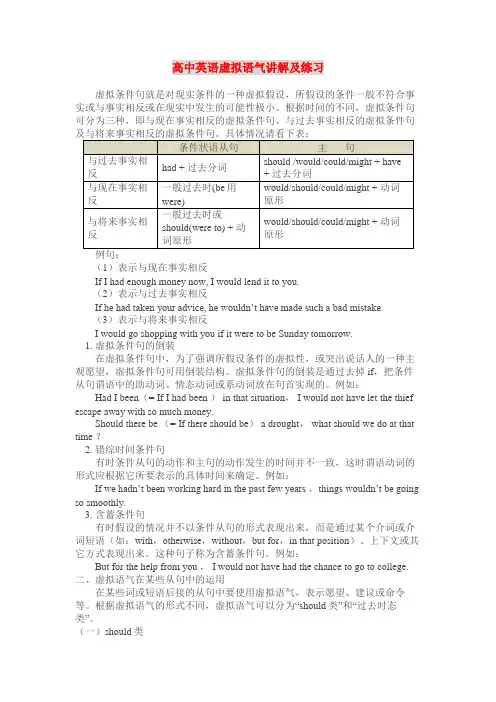
高中英语虚拟语气讲解及练习虚拟条件句就是对现实条件的一种虚拟假设,所假设的条件一般不符合事实或与事实相反或在现实中发生的可能性极小。
根据时间的不同,虚拟条件句可分为三种,即与现在事实相反的虚拟条件句、与过去事实相反的虚拟条件句(1)表示与现在事实相反If I had enough money now, I would lend it to you.(2)表示与过去事实相反If he had taken your advice, he wouldn’t have made such a bad mistake.(3)表示与将来事实相反I would go shopping with you if it were to be Sunday tomorrow.1. 虚拟条件句的倒装在虚拟条件句中,为了强调所假设条件的虚拟性,或突出说话人的一种主观愿望,虚拟条件句可用倒装结构。
虚拟条件句的倒装是通过去掉if,把条件从句谓语中的助动词、情态动词或系动词放在句首实现的。
例如:Had I been(= If I had been ) in that situation, I would not have let the thief escape away with so much money.Should there be (= If there should be) a drought, what should we do at that time ?2. 错综时间条件句有时条件从句的动作和主句的动作发生的时间并不一致,这时谓语动词的形式应根据它所要表示的具体时间来确定。
例如:If we hadn’t been working hard in the past few years ,thing s wouldn’t be going so smoothly.3. 含蓄条件句有时假设的情况并不以条件从句的形式表现出来,而是通过某个介词或介词短语(如:with,otherwise,without,but for,in that position)、上下文或其它方式表现出来。
高中英语虚拟语气讲解及练习附答案
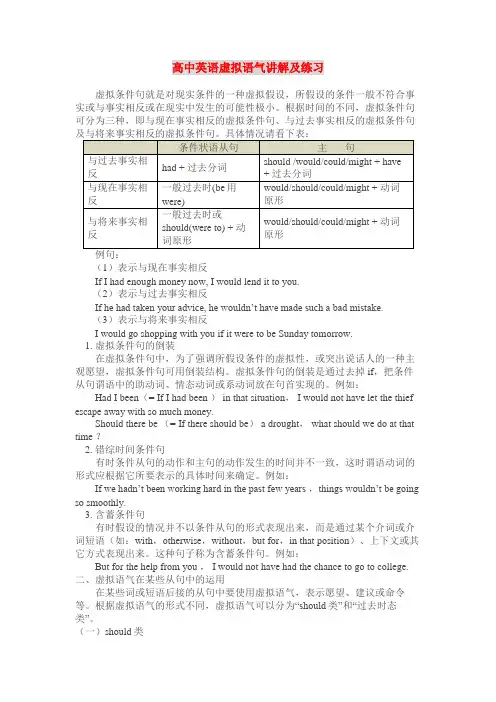
高中英语虚拟语气讲解及练习虚拟条件句就是对现实条件的一种虚拟假设,所假设的条件一般不符合事实或与事实相反或在现实中发生的可能性极小。
根据时间的不同,虚拟条件句可分为三种,即与现在事实相反的虚拟条件句、与过去事实相反的虚拟条件句(1)表示与现在事实相反If I had enough money now, I would lend it to you.(2)表示与过去事实相反If he had taken your advice, he wouldn’t have made such a bad mistake.(3)表示与将来事实相反I would go shopping with you if it were to be Sunday tomorrow.1. 虚拟条件句的倒装在虚拟条件句中,为了强调所假设条件的虚拟性,或突出说话人的一种主观愿望,虚拟条件句可用倒装结构。
虚拟条件句的倒装是通过去掉if,把条件从句谓语中的助动词、情态动词或系动词放在句首实现的。
例如:Had I been(= If I had been ) in that situation, I would not have let the thief escape away with so much money.Should there be (= If there should be) a drought, what should we do at that time ?2. 错综时间条件句有时条件从句的动作和主句的动作发生的时间并不一致,这时谓语动词的形式应根据它所要表示的具体时间来确定。
例如:If we hadn’t been working hard in the past few years ,thing s wouldn’t be going so smoothly.3. 含蓄条件句有时假设的情况并不以条件从句的形式表现出来,而是通过某个介词或介词短语(如:with,otherwise,without,but for,in that position)、上下文或其它方式表现出来。
高中英语虚拟语气讲解及练习题(附答案)
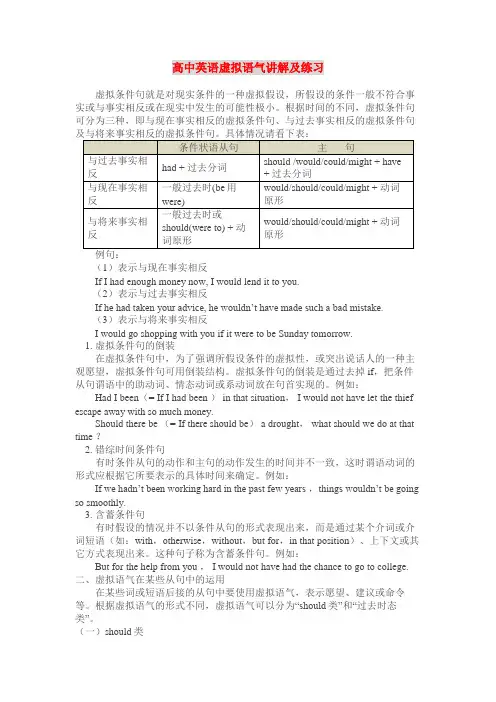
高中英语虚拟语气讲解及练习虚拟条件句就是对现实条件的一种虚拟假设,所假设的条件一般不符合事实或与事实相反或在现实中发生的可能性极小。
根据时间的不同,虚拟条件句可分为三种,即与现在事实相反的虚拟条件句、与过去事实相反的虚拟条件句(1)表示与现在事实相反If I had enough money now, I would lend it to you.(2)表示与过去事实相反If he had taken your advice, he wouldn’t have made such a bad mistake.(3)表示与将来事实相反I would go shopping with you if it were to be Sunday tomorrow.1. 虚拟条件句的倒装在虚拟条件句中,为了强调所假设条件的虚拟性,或突出说话人的一种主观愿望,虚拟条件句可用倒装结构。
虚拟条件句的倒装是通过去掉if,把条件从句谓语中的助动词、情态动词或系动词放在句首实现的。
例如:Had I been(= If I had been ) in that situation, I would not have let the thief escape away with so much money.Should there be (= If there should be) a drought, what should we do at that time ?2. 错综时间条件句有时条件从句的动作和主句的动作发生的时间并不一致,这时谓语动词的形式应根据它所要表示的具体时间来确定。
例如:If we hadn’t been working hard in the past few years ,thing s wouldn’t be going so smoothly.3. 含蓄条件句有时假设的情况并不以条件从句的形式表现出来,而是通过某个介词或介词短语(如:with,otherwise,without,but for,in that position)、上下文或其它方式表现出来。
高中虚拟语气的讲解+练习+详解
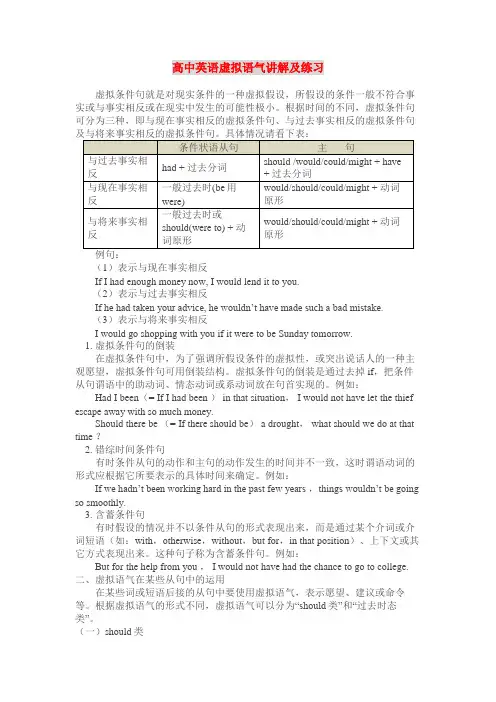
高中英语虚拟语气讲解及练习虚拟条件句就是对现实条件的一种虚拟假设,所假设的条件一般不符合事实或与事实相反或在现实中发生的可能性极小。
根据时间的不同,虚拟条件句可分为三种,即与现在事实相反的虚拟条件句、与过去事实相反的虚拟条件句(1)表示与现在事实相反If I had enough money now, I would lend it to you.(2)表示与过去事实相反If he had taken your advice, he wouldn’t have made such a bad mistake.(3)表示与将来事实相反I would go shopping with you if it were to be Sunday tomorrow.1. 虚拟条件句的倒装在虚拟条件句中,为了强调所假设条件的虚拟性,或突出说话人的一种主观愿望,虚拟条件句可用倒装结构。
虚拟条件句的倒装是通过去掉if,把条件从句谓语中的助动词、情态动词或系动词放在句首实现的。
例如:Had I been(= If I had been ) in that situation, I would not have let the thief escape away with so much money.Should there be (= If there should be) a drought, what should we do at that time ?2. 错综时间条件句有时条件从句的动作和主句的动作发生的时间并不一致,这时谓语动词的形式应根据它所要表示的具体时间来确定。
例如:If we hadn’t been working hard in the past few years ,thing s wouldn’t be going so smoothly.3. 含蓄条件句有时假设的情况并不以条件从句的形式表现出来,而是通过某个介词或介词短语(如:with,otherwise,without,but for,in that position)、上下文或其它方式表现出来。
高中英语虚拟语气讲解及练习题(附答案)
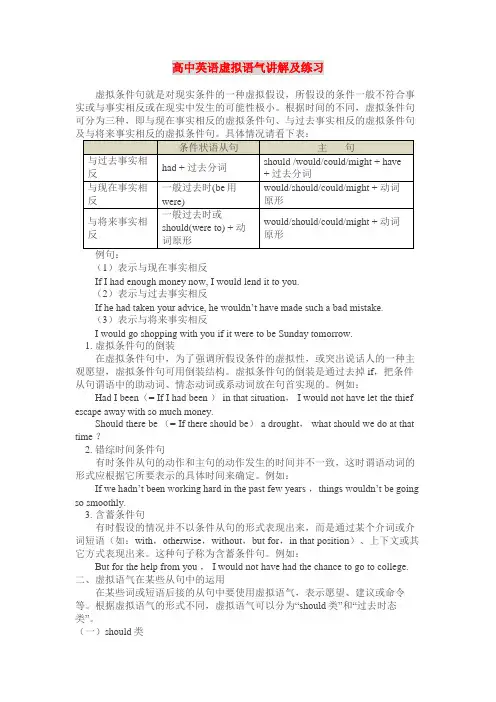
高中英语虚拟语气讲解及练习虚拟条件句就是对现实条件的一种虚拟假设,所假设的条件一般不符合事实或与事实相反或在现实中发生的可能性极小。
根据时间的不同,虚拟条件句可分为三种,即与现在事实相反的虚拟条件句、与过去事实相反的虚拟条件句(1)表示与现在事实相反If I had enough money now, I would lend it to you.(2)表示与过去事实相反If he had taken your advice, he wouldn’t have made such a bad mistake.(3)表示与将来事实相反I would go shopping with you if it were to be Sunday tomorrow.1. 虚拟条件句的倒装在虚拟条件句中,为了强调所假设条件的虚拟性,或突出说话人的一种主观愿望,虚拟条件句可用倒装结构。
虚拟条件句的倒装是通过去掉if,把条件从句谓语中的助动词、情态动词或系动词放在句首实现的。
例如:Had I been(= If I had been ) in that situation, I would not have let the thief escape away with so much money.Should there be (= If there should be) a drought, what should we do at that time ?2. 错综时间条件句有时条件从句的动作和主句的动作发生的时间并不一致,这时谓语动词的形式应根据它所要表示的具体时间来确定。
例如:If we hadn’t been working hard in the past few years ,thing s wouldn’t be going so smoothly.3. 含蓄条件句有时假设的情况并不以条件从句的形式表现出来,而是通过某个介词或介词短语(如:with,otherwise,without,but for,in that position)、上下文或其它方式表现出来。
虚拟语气讲解及练习题(含答案和解释)
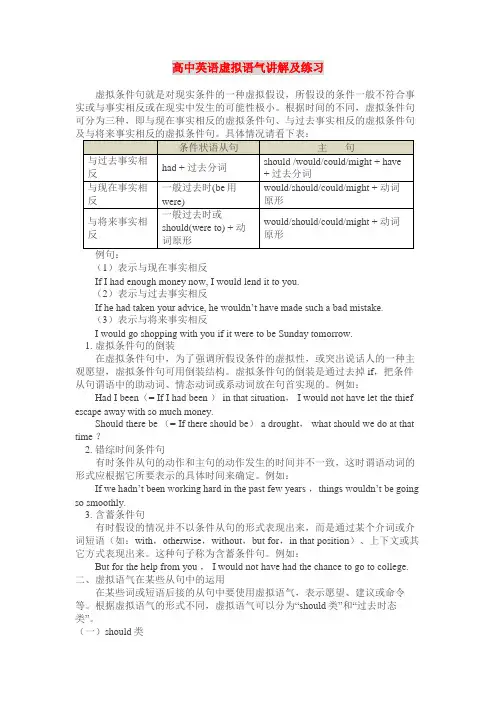
高中英语虚拟语气讲解及练习虚拟条件句就是对现实条件的一种虚拟假设,所假设的条件一般不符合事实或与事实相反或在现实中发生的可能性极小。
根据时间的不同,虚拟条件句可分为三种,即与现在事实相反的虚拟条件句、与过去事实相反的虚拟条件句(1)表示与现在事实相反If I had enough money now, I would lend it to you.(2)表示与过去事实相反If he had taken your advice, he wouldn’t have made such a bad mistake.(3)表示与将来事实相反I would go shopping with you if it were to be Sunday tomorrow.1. 虚拟条件句的倒装在虚拟条件句中,为了强调所假设条件的虚拟性,或突出说话人的一种主观愿望,虚拟条件句可用倒装结构。
虚拟条件句的倒装是通过去掉if,把条件从句谓语中的助动词、情态动词或系动词放在句首实现的。
例如:Had I been(= If I had been ) in that situation, I would not have let the thief escape away with so much money.Should there be (= If there should be) a drought, what should we do at that time ?2. 错综时间条件句有时条件从句的动作和主句的动作发生的时间并不一致,这时谓语动词的形式应根据它所要表示的具体时间来确定。
例如:If we hadn’t been working hard in the past few years ,thing s wouldn’t be going so smoothly.3. 含蓄条件句有时假设的情况并不以条件从句的形式表现出来,而是通过某个介词或介词短语(如:with,otherwise,without,but for,in that position)、上下文或其它方式表现出来。
高考英语虚拟语气专项讲解及练习含答案
高中英语虚拟语气讲解及练习虚拟条件句就是对现实条件的一种虚拟假设,所假设的条件一般不符合事实或与事实相反或在现实中发生的可能性极小。
根据时间的不同,虚拟条件句可分为三种,即与现在事实相反的虚拟条件句、与过去事实相反的虚拟条件句(1)表示与现在事实相反If I had enough money now, I would lend it to you.(2)表示与过去事实相反If he had taken your advice, he wouldn’t have made such a bad mistake.(3)表示与将来事实相反I would go shopping with you if it were to be Sunday tomorrow.1. 虚拟条件句的倒装在虚拟条件句中,为了强调所假设条件的虚拟性,或突出说话人的一种主观愿望,虚拟条件句可用倒装结构。
虚拟条件句的倒装是通过去掉if,把条件从句谓语中的助动词、情态动词或系动词放在句首实现的。
例如:Had I been(= If I had been ) in that situation, I would not have let the thief escape away with so much money.Should there be (= If there should be) a drought, what should we do at that time ?2. 错综时间条件句有时条件从句的动作和主句的动作发生的时间并不一致,这时谓语动词的形式应根据它所要表示的具体时间来确定。
例如:If we hadn’t been working hard in the past few years ,thing s wouldn’t be going so smoothly.3. 含蓄条件句有时假设的情况并不以条件从句的形式表现出来,而是通过某个介词或介词短语(如:with,otherwise,without,but for,in that position)、上下文或其它方式表现出来。
高中英语 虚拟语气讲解及练习(有答案)
高中英语虚拟语气讲解及练习虚拟条件句就是对现实条件的一种虚拟假设,所假设的条件一般不符合事实或与事实相反或在现实中发生的可能性极小。
根据时间的不同,虚拟条件句可分为三种,即与现在事实相反的虚拟条件句、与过去事实相反的虚拟条件句(1)表示与现在事实相反If I had enough money now, I would lend it to you.(2)表示与过去事实相反If he had taken your advice, he wouldn’t have made such a bad mistake.(3)表示与将来事实相反I would go shopping with you if it were to be Sunday tomorrow.1. 虚拟条件句的倒装在虚拟条件句中,为了强调所假设条件的虚拟性,或突出说话人的一种主观愿望,虚拟条件句可用倒装结构。
虚拟条件句的倒装是通过去掉if,把条件从句谓语中的助动词、情态动词或系动词放在句首实现的。
例如:Had I been(= If I had been ) in that situation, I would not have let the thief escape away with so much money.Should there be (= If there should be) a drought, what should we do at that time ?2. 错综时间条件句有时条件从句的动作和主句的动作发生的时间并不一致,这时谓语动词的形式应根据它所要表示的具体时间来确定。
例如:If we hadn’t been working hard in the past few years ,thing s wouldn’t be going so smoothly.3. 含蓄条件句有时假设的情况并不以条件从句的形式表现出来,而是通过某个介词或介词短语(如:with,otherwise,without,but for,in that position)、上下文或其它方式表现出来。
高中英语虚拟语气详解及练习(含答案)
高中英语虚拟语气讲解及练习虚拟条件句就是对现实条件的一种虚拟假设,所假设的条件一般不符合事实或与事实相反或在现实中发生的可能性极小。
根据时间的不同,虚拟条件句可分为三种,即与现在事实相反的虚拟条件句、与过去事实相反的虚拟条件句(1)表示与现在事实相反If I had enough money now, I would lend it to you.(2)表示与过去事实相反If he had taken your advice, he wouldn’t have made such a bad mistake.(3)表示与将来事实相反I would go shopping with you if it were to be Sunday tomorrow.1. 虚拟条件句的倒装在虚拟条件句中,为了强调所假设条件的虚拟性,或突出说话人的一种主观愿望,虚拟条件句可用倒装结构。
虚拟条件句的倒装是通过去掉if,把条件从句谓语中的助动词、情态动词或系动词放在句首实现的。
例如:Had I been(= If I had been ) in that situation, I would not have let the thief escape away with so much money.Should there be (= If there should be) a drought, what should we do at that time ?2. 错综时间条件句有时条件从句的动作和主句的动作发生的时间并不一致,这时谓语动词的形式应根据它所要表示的具体时间来确定。
例如:If we hadn’t been working hard in the past few years ,thing s wouldn’t be going so smoothly.3. 含蓄条件句有时假设的情况并不以条件从句的形式表现出来,而是通过某个介词或介词短语(如:with,otherwise,without,but for,in that position)、上下文或其它方式表现出来。
虚拟语气讲解和练习(附答案)
虚拟语气讲解和练习(附答案)概念理解一、动词的语气语气用来区别讲话人对某一行为或事情的看法和态度。
英语中的语气(mood)1.陈述语气Where there is a will, there's a way. 有志者事竟成。
Can you help me carry the box upstairs 你能帮我把箱子搬到楼上吗?How I missed the life in the countryside! 我多么想念乡村的生活啊!2.祈使语气Come this way, please! 请这边走。
Don't make any noise, will you 别吵,行吗?Do be careful when crossing the street. 过马路时一定要小心。
3.虚拟语气If I were a bird, I could fly in the air. 如果我是一只小鸟,我就能在空中飞行。
I wish it were spring all the year round. 但愿四季如春。
May good luck be yours! 祝你好运!知识清单清单一、条件句中的虚拟语气A.真实条件句If he doesn't come at 8, we won't wait for him. 如果他八点不来,我们就不等他了。
If a flood happened in the past, there was usually a great loss of life and property. 过去发生洪水的话,常有很大的生命和财产损失。
We shall go there unless it rains tomorrow. 如果明天不下雨,我们将去那里。
I'll let you use my bike on condition that you keep it clean. 如果你能保持车子干净,我就让你用我的自行车。
- 1、下载文档前请自行甄别文档内容的完整性,平台不提供额外的编辑、内容补充、找答案等附加服务。
- 2、"仅部分预览"的文档,不可在线预览部分如存在完整性等问题,可反馈申请退款(可完整预览的文档不适用该条件!)。
- 3、如文档侵犯您的权益,请联系客服反馈,我们会尽快为您处理(人工客服工作时间:9:00-18:30)。
高中英语虚拟语气知识点及练习内部编号:(YUUT-TBBY-MMUT-URRUY-UOOY-DBUYI-0128)虚拟语气:虚拟证据表示说的话不是事实,或者不可能发生的情况,而是一种愿望、建议或者与事实相反的假设等,一般常用于正式的书面语中。
一、虚拟语气在if条件从句中的用法:1、a. If I were you, I would apply for the job.b. If I lived near my office, I would walk to the office.与现在事实相反,If条件从句谓语:过去式(be用were)主句谓语:should / would / could / might+动词原形2、a. If you had been more careful, You could have passed the exam.b. If you had turned off the gas, the house wouldn’t have caught fire.与过去事实相反,If条件从句谓语:had+动词过去分词主句谓语:should / would / could / might + have done3、a. If it should rain tomorrow, we would not go camping.b. if it were to rain tomorrow, we would not go camping.c. If it rained tomorrow, we would not go camping.与将来事实相反:If条件从句谓语:过去式 / should + v原形 / were + to do主句谓语:should / would / could / might + do二、混合虚拟条件句:不同时间的虚拟,各遵守各的规则,如:a. If you had followed the doctor’s advice, you would be quite all right now.从句叙述与过去事实相反(had + done),主句叙述与现在事实相反(would + v)b. If I were you, I would have taken his advice.从句叙述与现在事实相反(过去式),主句叙述与过去事实相反(would have done)三、虚拟语气在宾语从句中的适用:a. They demanded that the black people (should) be treated as well as white people.b. He suggested that we (should) start off at once.(建议)His smile suggested that he was satisfied with our work.(暗示,表明)c. I insisted that you (should) give me my money back.(坚决(持),要求)Mike insisted that he had never stolen anything.(坚持说/坚持认为)这类动词有:一坚持(insist),二命令(order, command),三建议(advise, suggest, recommend, propose),四要求(require, request, demand, desire)d. I wish I were a bird.I do wish you would come earlier next time.I wish I had done better in my work.四、虚拟语气在主语从句中的适用:1. It was / is important / vital / necessary / appropriate / proper / right that……eg: It is important that we (should) think before we decide.2. It is important that we (should) think before we decide.据建议/要求/命令……eg: It is suggested that parents (should) spend more time with their children alone.五、虚拟语气在表语从句中的适用(与表示决定、主张、要求、建议、命令的名词。
如:suggestion, proposal, advice, order, demand, requirement等)构成的表语从句常用should + do结构eg:Our suggestion is that the meeting (should) be put off.六、虚拟语气在同位语从句中的适用(与表示决定、主张、要求、建议、命令的名词。
如:suggestion, proposal, advice, order, demand, requirement等)构成的同位语从句中常用should + do结构eg: Doctors give us some advice that we (should) pay more attention to our health.七、含蓄条件句的虚拟语气:由but for(要不是),Without(要是没有),otherwise(要不然),but等引导如:but for the storm, I would have arrived much earlier.Without your help, I wouldn’t have passed the driving test.I was too busy at that time. Otherwise I would have called you.I would have come to see you, but I was too busy.注意:句子或主句中的谓语动词的形式视具体情况而定。
这是考查考生应变能力的最佳试题。
八、虚拟语气的其他用法1、It’s (high) time that 从句: (从句用过去式或者should + 动词原形eg:It’s high time that you went to school.2、If only(要是……就好了……)用一般过去式表示与现在或将来事实相反,用过去完成的表示与过去事实相反。
eg:If only I were a film star.If only I had known his phone unmber.3、as if引导的方式状语从句中的虚拟语气:eg: He treats me as if I were his own son.She speaks English so fluently as if she had learned English in America for years.He learns English so hard as if he would go abroad.4、would rather + that从句中的虚拟语气eg: I would rather that you paid me now.I would rather that you hadn’t done it before.5、虚拟语气也常用于“if it were / had been not for……”句型中,意为“要不是……”eg: If it were not for peace, we could not be living a happy life today.If it had not been for your advice, I would not have accepted the job.6、省略if的虚拟语气:从句中有were, had, should等词语,省略if,将were, had, should提到句首,如:a. If it should rain tomorrow, we would not go camping.→Should it rain tomorrow, we would not go camping.b. If it were to rain tomorrow, we would not go camping.→Were it to rain tomorrow, we would not go camping.c. If I had had the money last year, I would have bought the house.→Had I had the money last year, I would have bought the house.()1. If we adequate preparations, the conference wouldn’t have been so successful.A. haven’t madeB. wouldn’t makeC. didn’t makeD. hadn’t made()2. Jack is a great talker. It’s high time that he something instead of just taking.A. will doB. has doneC. doD. did()3. Don’t handle the vase as if it made of steel.A. isB. wereC. has beenD. had been()4. Sorry, I am too busy now. If I time, I would certainly go for an outing with you.A. have hadB. had hadC. haveD. had()5. We lost our way in that small village, otherwise we more places of interest yesterday.A. visitedB. had visitedC. would visitD. would have visited()6. Grace doesn’t want to move to New York because she thinks if she there, she wouldn’t be able to see her parents veryoften.A. livesB. would liveC. has livedD. were to live()7. We the difficulty together, but why didn’t you tell meA. should faceB. might faceC. could have facedD. must have faced()8. If my car more reliable, I would have driven to Lhasa instead of flying last summer.A. wasB. had beenC. should beD. would be()9. Had they known what was coming next, they second thoughts.A. may haveB. could haveC. must have hadD. might have had()10. ―Where are the children The dinner’s going to be completely ruined.―I wish they always late.A. weren’tB. hadn’t beenC. wouldn’t beD. wouldn’t have been()11. I through that bitter period without your generous help.A. couldn’t have goneB. didn’t goC. wouldn’t goD. hadn’t gone()12. Maybe if I science, and not literature then, I would be able to give you more help.A. studiedB. would studyC. had studiedD. was studying()13. Teachers recommend parents their children under 12 to ride bicycles to school for safety.A. not allowB. do not allowC. mustn’t allowD. couldn’t allow()14. If he my advice, he wouldn’t have lost his job.A. followedB. should followC. had followedD. would follow()15. ―John went to the hospital alone.―If he me about it, I would have gone with him.A. should tellB. tellsC. toldD. had told()16. ―The weather has been very hot and dry.―Yes. If it had rained even a drop, things would be muchbetter now! And my vegetables .A. wouldn’t dieB. didn’t dieC. hadn’t diedD. wouldn’t have died()17. Had I known about this computer program, a huge amount of time and energy .A. would have been savedB. had been savedC. will be savedD. was saved()18. I have watched that movie it’ll give me horrible dreams.A. shouldn’tB. needn’tC. couldn’tD. mustn’t()19. George is going to talk about the geography of his country, but I’d rather he more on its culture.A. focusB. focusedC. would focusD. had focused()20. This printer is of good quality. If it break down within the first year, we would repair it at our expense.A. wouldB. shouldC. couldD. might。
